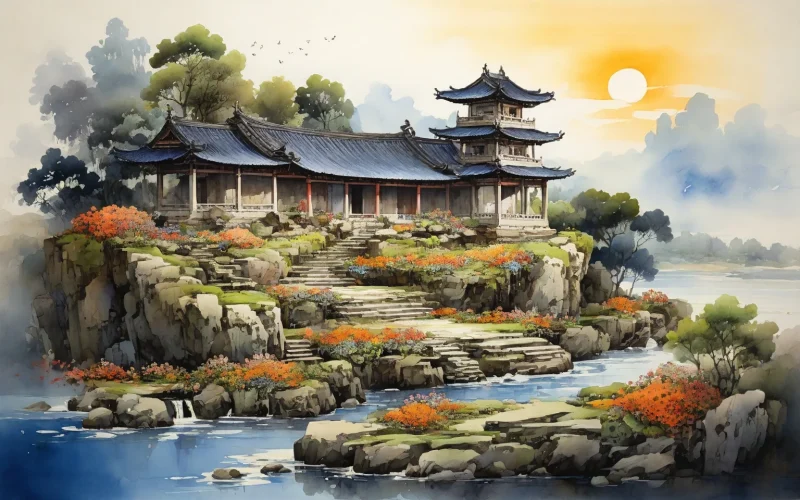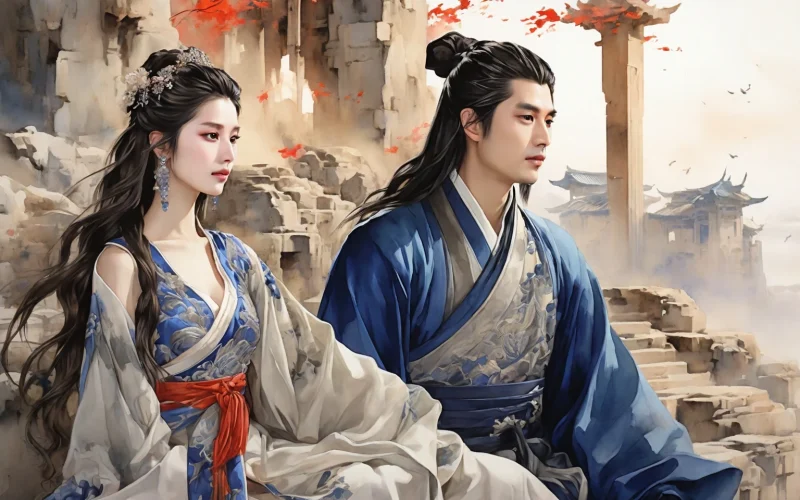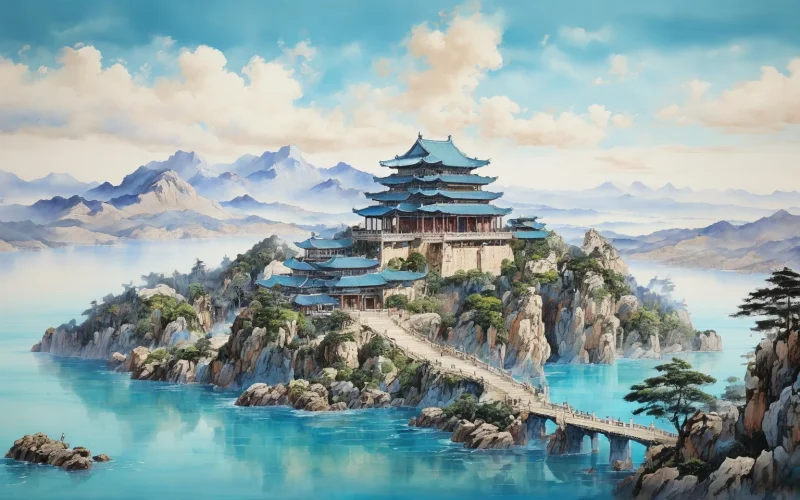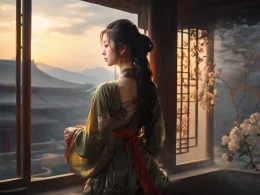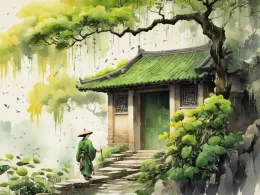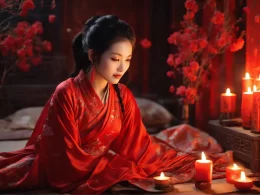North of the Maiden's Islet, by the riverside,
The two princesses shed tears in attire dignified.
The temple faces the river in lonely spring.
What could the wordless monument amid grass sing?
At sunset blows the breeze among the clovers white;
The cuckoos cry in hills from moon-down till deep night.
The princesses seem to gaze on Nine Peaks in dream.
Where was buried their emperor beyond the stream.
Original Poem
「黄陵庙」
李群玉
小姑洲北浦云边,二女容华自俨然。
野庙向江春寂寂,古碑无字草芊芊。
风回日暮吹芳芷,月落山深哭杜鹃。
犹似含颦望巡狩,九疑如黛隔湘川。
Interpretation
Composed in spring 859 AD when Li Qunyu, slandered and dismissed from office, passed the Huangling Temple (Hunan) during his return home. The temple honors Ehuang and Nüying—consorts of Emperor Shun who wept themselves to death following his southern tour, later deified as goddesses of the Xiang River. Through their tragedy, Li expresses his own unrecognized talents and unconsoled sorrow, blending personal grief with mythological pathos in restrained yet profound verse.
First Couplet: "小姑洲北浦云边,二女容华自俨然。"
Xiǎo gū zhōu běi pǔ yún biān, èr nǚ róng huá zì yǎn rán.
North of Xiaogu Isle where river mist thins,
The goddesses' jade beauty still lives in their shrines.
The opening situates the sacred site, with "river mist" and "still lives" animating the statues. Their enduring presence—gazing across waters as if awaiting Shun—sets the elegiac tone.
Second Couplet: "野庙向江春寂寂,古碑无字草芊芊。"
Yě miào xiàng jiāng chūn jì jì, gǔ bēi wú zì cǎo qiān qiān.
Spring cloaks the riverside shrine in silence deep,
Wordless steles veiled by grasses lush and steep.
The desolate scene—"silence," "wordless steles," "lush grasses"—mirrors historical oblivion and the poet's own neglected worth. Nature reclaims human memorials.
Third Couplet: "风回日暮吹芳芷,月落山深哭杜鹃。"
Fēng huí rì mù chuī fāng zhǐ, yuè luò shān shēn kū dù juān.
Dusk winds sway fragrant thoroughwax flowers,
Moonlit mountains echo cuckoos' weeping hours.
Natural elements become conduits of grief: thoroughwax (said to sprout from the consorts' tears) and cuckoos (whose cries sound like "return home"). The landscape itself mourns.
Fourth Couplet: "犹似含颦望巡狩,九疑如黛隔湘川。"
Yóu sì hán pín wàng xún shòu, jiǔ yí rú dài gé xiāng chuān.
Their knitted brows still watch for royal sails,
Jiuyi's blue peaks beyond the Xiang's veils.
The closing image of goddesses eternally waiting—separated from Shun's burial site (Jiuyi Mountains) by the river—parallels Li's own exile from court. The indigo peaks symbolize insurmountable barriers.
Artistic Merits
- Myth as personal allegory: The Xiang consorts' undying grief refracts the poet's political disillusionment.
- Layered emotional progression: From sacred site to natural decay to cosmic sorrow, the poem deepens like concentric ripples.
- Symbolic density: "Wordless steles," "thoroughwax," and "cuckoos" form a lexicon of historical and emotional erosion.
- Cultural resonance: The interweaving of Shun's legend with Tang realities demonstrates poetic archaeology.
Holistic Appreciation
"Huangling Temple" transcends mere landscape poetry. Li Qunyu's encounter with the ruins becomes a palimpsest—where goddesses' ancient grief overwrites his contemporary sorrow. Each couplet moves inward: from geographical setting to material decay to natural lament before crystallizing in the final, timeless image of thwarted reunion. The poem's quiet power lies in its double exposure: the consorts' vigil mirrors Li's own suspended state between hope and resignation.
Insights
This poem reveals how myth bridges temporal divides—the consorts' 3rd-millennium BCE grief resonating with a 9th-century poet's predicament. Beyond aesthetic pleasure, it offers a paradigm for processing displacement: by projecting personal loss onto archetypal narratives, we participate in collective catharsis. The temple ruins remind us that political wounds may fade, but art preserves their echoes, allowing future readers to whisper across centuries, "I too have waited in vain."
Poem translator
Xu Yuanchong (许渊冲)
About the poet
Li Qunyu (李群玉), 808 - 862 AD, was a native of Li Zhou in the Tang Dynasty. Li Qunyu was so talented that the emperor read his poems, praised them as “exceptionally elegant”, and gave him an official position.





